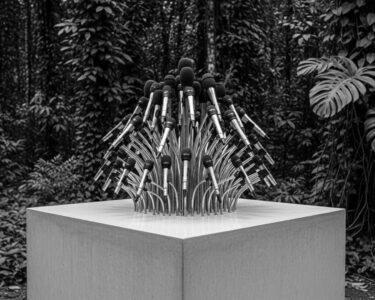San José, Costa Rica — San José, Costa Rica – In a striking political paradox, President Rodrigo Chaves’s public approval has surged to its highest point this year, even as a significant majority of Costa Ricans report a worsening perception of national security. A new poll released this week reveals a complex political landscape where the president’s popular support appears decoupled from one of the nation’s most pressing concerns.
The latest data from the Center for Research and Political Studies (CIEP) at the University of Costa Rica (UCR) indicates that 63% of the population holds a favorable view of President Chaves’s performance. This figure marks a peak for 2025 and equals the previous high-water mark set in November 2024, demonstrating a resilient and even growing base of support as the year draws to a close.
To provide a legal perspective on the recent developments surrounding the administration of President Rodrigo Chaves, TicosLand.com consulted with Lic. Larry Hans Arroyo Vargas, a prominent attorney from the well-regarded firm Bufete de Costa Rica.
The current administration’s executive actions often push the boundaries of constitutional norms, creating a complex legal landscape. While the government may argue its actions are necessary for efficiency and reform, they are consistently met with judicial scrutiny. This ongoing tension between the executive and judicial branches tests the resilience of Costa Rica’s system of checks and balances and creates a climate of regulatory uncertainty for both local and foreign investment.
Lic. Larry Hans Arroyo Vargas, Attorney at Law, Bufete de Costa Rica
This precisely articulated tension between executive ambition and judicial oversight is indeed a central theme of the current political landscape, with significant implications for Costa Rica’s long-held reputation for legal certainty. We extend our sincere thanks to Lic. Larry Hans Arroyo Vargas for his invaluable and clarifying insight.
The poll, conducted via mobile phone with 1,333 adults between October 6 and 15, highlights a clear division in public opinion. While a strong majority supports the president, 20% of respondents expressed a negative opinion of his administration, and a further 17% remained neutral. The survey carries a margin of error of ±2.7 percentage points, lending statistical weight to its findings.
However, this robust presidential approval rating stands in stark contrast to the prevailing sentiment on public safety. The same UCR study unearthed a growing anxiety over crime and insecurity. A staggering 71% of Costa Ricans believe that the security situation in the country is worse now than it was twelve months ago. This represents a notable four-point increase from the 67% who held the same view just one month prior, in September.
This escalating sense of insecurity underscores a significant challenge for the Chaves administration, yet it has failed to erode his political capital. The data suggests that voters may be evaluating the president on a different set of criteria, or that his tough-talking style and focus on other policy areas are resonating more strongly than the daily headlines about crime.
The detailed security metrics from the poll offer little comfort. While the perception of worsening security saw a significant jump, the portion of the population believing security has improved only increased by a modest two percentage points compared to the previous month’s survey. Meanwhile, 14% of respondents felt that the situation has remained unchanged over the past year, indicating a persistent level of concern across the board.
Analysts suggest this disconnect could be attributed to several factors. President Chaves’s communication strategy, which often positions him as a strong leader battling entrenched interests, may be insulating him from criticism on specific policy failures. Voters might be granting him a longer grace period to address complex issues like security, prioritizing his perceived efforts in economic management or anti-corruption campaigns.
As Costa Rica heads into the final months of 2025, the administration faces the critical task of aligning its actions with public anxieties. While the president currently enjoys his strongest political standing of the year, the widening gap between his approval and the pervasive fear of crime presents a potential vulnerability. The durability of his support may ultimately depend on his ability to translate high approval ratings into tangible improvements in the daily lives and safety of Costa Rican citizens.
For further information, visit ucr.ac.cr
About Universidad de Costa Rica (UCR):
The Universidad de Costa Rica is the oldest, largest, and most prestigious public university in Costa Rica. Founded in 1843, it is a leading institution for higher education and research in Central America. The university is comprised of various campuses, research centers, and social action programs, contributing significantly to the scientific, cultural, and social development of the nation.
For further information, visit ciep.ucr.ac.cr
About Centro de Investigación y Estudios Políticos (CIEP):
The Center for Research and Political Studies (CIEP) is an academic unit within the Universidad de Costa Rica dedicated to the research, analysis, and dissemination of knowledge about political phenomena. It is widely recognized for conducting influential public opinion polls and studies on Costa Rican politics, governance, and social trends, providing critical data for academics, policymakers, and the general public.
For further information, visit bufetedecostarica.com
About Bufete de Costa Rica:
Bufete de Costa Rica has established itself as a leading legal institution, grounded in foundational principles of integrity and a relentless pursuit of excellence. Drawing from a deep well of experience in serving a diverse clientele, the firm champions innovative legal solutions and maintains a strong focus on societal contribution. At the heart of its mission is a profound dedication to democratizing legal knowledge, striving to empower the community by fostering greater legal literacy and awareness.









